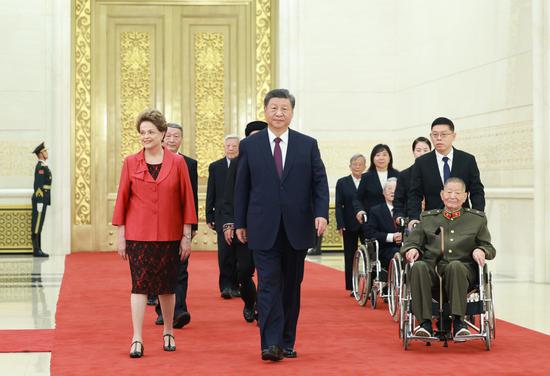Chinese tourists have shown an ever increasing enthusiasm for traveling abroad, embarking on trips during this year's weeklong National Day holiday to more niche destinations, such as countries and regions involved in the Belt and Road Initiative and Africa.
The bookings of international flights for the holiday had already doubled the level seen last year as of mid-September.
Qunar, a Beijing-based online travel agency, said that its global bookings were for some 1,600 destinations in more than 140 countries, and over half of the new destinations are African countries.
In particular, bookings made by people living in third-tier and smaller cities jumped by 250 percent year-on-year, indicating Chinese residents' stronger travel demand, according to Qunar.
Dai Bin, president of the China Tourism Academy, said, "Based on data of travel product bookings, it is expected that the number of tourists taking trips during the holiday will reach a new historical high."
Furthermore, since this year's National Day holiday marks the 75th anniversary of the founding of the People's Republic of China, travel for Red tourism was expected to increase, along with that for autumn sightseeing and family reunions, Dai said.
Topping the list of outbound tourism destinations that have seen the highest number of flight bookings from the Chinese mainland are the Hong Kong Special Administrative Region; Bangkok, Thailand; Kuala Lumpur, Malaysia; Seoul, South Korea; and Osaka, Japan, Qunar said.
Although most travelers from the Chinese mainland chose destinations within five hours of flying time, the number traveling farther has increased.
For the holiday period, also known as Golden Week, the countries that have seen the fastest growth in flight and hotel bookings by Chinese travelers include Azerbaijan, Cuba, Georgia, Guatemala, Kazakhstan, Madagascar, Mexico, Montenegro, Morocco and Tajikistan, Qunar found.
"Azerbaijan's and Georgia's visa-free entries for Chinese travelers have significantly boosted their tourism popularity," said Cai Muzi, a Qunar researcher. "Fueled by the building of the Air Silk Road and a further increase of flights, the demand for tourism and commercial exchanges between China and countries along the Silk Road will continue to grow rapidly."
Furthermore, thanks to a rising number of flights connecting China and Africa, and more frequent trade, tourism and people-to-people exchanges, traveling to Africa has become increasingly popular for Chinese tourists, Cai said.
"The demand for hotel bookings and flights from China to Africa is expected to continue its growth momentum," the researcher added.
With the recovery of the entire supply chain of international travel after the COVID-19 pandemic, including the rebound of flight capacity, there has been a significant decline in the cost of outbound travel. As a result, supported by the large volume of bookings, the overall revenue of the outbound tourism market is expected to far surpass that of last year, industry insiders have said.
The average prices of flight tickets from China to popular outbound destinations such as Japan, Thailand and South Korea have fallen more than 20 percent, according to FlightAI, a market insight platform affiliated with Chinese online travel agency Trip.com.
In addition, the overall decline in the prices of global hotel bookings has made outbound travel more competitive, with travel expenses from China to some Southeast Asian countries becoming lower than for some domestic destinations, FlightAI has found.
Meanwhile, the number of visa applications for outbound travel during the National Day holiday surged 70 percent year-on-year.
Chinese tourists have shown a stronger awareness of applying for visas in advance. On average, they applied for visas 68 days before departure, about one month earlier than last year, according to Trip.com.
For example, Xu Yunlei, 40, a teacher from Chongqing who went on a weeklong trip to Australia this year with his friends, applied for a visa two months in advance.


















































 京公网安备 11010202009201号
京公网安备 11010202009201号